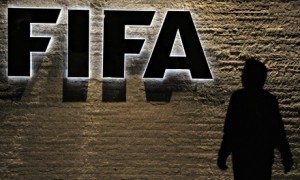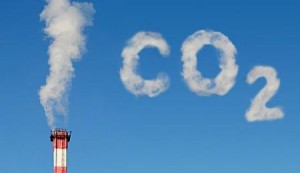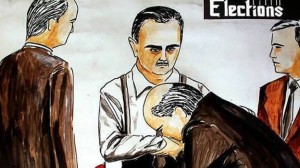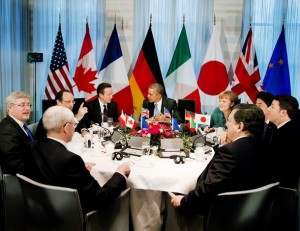1. They think it’s all over.. It is now
Fifa continues to be riddled with corruption allegations that frequently prove true, including the most recent emergence that Fifa’s chief ethics investigator has decided to ignore millions of documents obtained by the Sunday Times which offer potentially crucial and condemning evidence.
Jim Murphy, the shadow secretary for international development, labelled the current official investigation into Fifa corruption “a sham” and said Fifa would be “forever tainted”. The investigation, headed by Michael Garcia, will publish its findings on the 9th of June.
Perpetual corruption allegations and deteriorating image have marred Fifa’s reputation, and persistent worker and moral violations in the preparations for Qatar have forced Senior Fifa figures for the first time to seriously consider possible ramifications of ordering a re-run of the vote to stage the 2022 World Cup. Its testament to the scale of problems Fifa are currently facing that stories surrounding corruption and a negative depiction of the 2022 World Cup garners equal if not more coverage than the imminent competition in Brazil.
- Interactive guide: the allegations against Bin Hammam.
- FIFA’s Platini strikes back at Daily Telegraph over Qatar corruption.
- Eric Cantona: Fifa’s corruption divides Brazilian football from its roots.
2. Remembering Tiananmen
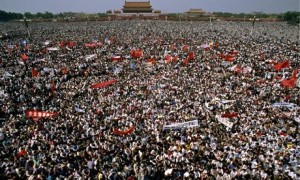
A sea of student protesters gather in Tiananmen square, 4 May 1989.
Wednesday saw the anniversary of the Tiananmen square protests. It was June 4th 1989 when the Chinese Communist Party (CCP) sent 200,00 soldiers in armoured tanks to suppress the peaceful pro-democracy protest in Beijing’s Tiananmen Square, causing a mass of fatalities and thousands more injuries.
Amid clampdowns in Mainland China which saw to house arrests, increased security, censorship and even the banning of specific search terms relating to Tiananmen. There was a great disparity between Mainland China and Hong Kong. Tens of thousands of people gathered at a candlelit vigil in Hong Kong on Wednesday to commemorate the Tiananmen Square crackdown, while tight security in Beijing and a pre-emptive strike against activists prevented the public from marking the 25th anniversary.
Authorities in China also wiped the biographies of senior military leaders who have recently been revealed to have played an active role in orchestrating the massacre of unarmed civilians.
- Portraits of Tiananmen: Activists, supporters and observers recall their memories of the pro-democracy protest at Beijing’s Tiananmen Square in 1989.
- In North Korea, China’s Tiananmen Square protests stirred hope for change.
- Tiananmen Square: What happened to Tank Man?
3. Climate change barriers broken down with US/Chinese capitulations
It would seem that both the American and Chinese political authorities are finally taking climate change seriously. President Obama announced a historic effort to tackle global-warming gases, vowing to cut carbon pollution by 30% by 2030; in what Al Gore is calling “the most important step taken to combat the climate crisis in our country’s history”.
China, the world’s biggest greenhouse gas emitter, will limit its total emissions for the first time by the end of this decade, according to a top government advisor. Both efforts echo the joint U.S-China statement announced in Washington on the 15th of Febuary: “In light of the overwhelming scientific consensus on climate change and its worsening impacts, and the related issue of air pollution from burning fossil fuels, the United States and China recognize the urgent need for action to meet these twin challenges.”
Doug Parr, Greenpeace UK’s chief scientist, said that the move by China, so shortly after the US announcement, showed “momentum” in the climate talks process.
He said: “In the last 24 hours we’ve had two major announcements from China and the US which send a powerful signal to other world leaders ahead of crucial climate talks later this year.”
- China plans absolute CO2 cap from 2016
- Carbon emission rules ‘set to spur innovation’
- President Obama gets serious on climate change
4. Vote for Assad, or else..
Syrian President Bashar al-Assad has won a third term in office after securing 88.7% of votes in Tuesday’s presidential election, the parliamentary speaker has announced. Voting took place in government-controlled areas, but not in parts of the north and east held by rebels.
Legitimacy of the election is questioned and vote fixing was assumed to be inevitable. The vote has faced sharp criticism from the US and its allies. “You can’t have an election where millions of your people don’t even have an ability to vote,” Mr Kerry said.
The EU said it could not be considered “a genuinely democratic vote”.
In a speech at the China-Arab forum on Thursday, China’s President Xi Jinping did not mention the vote but called for “the opening of an inclusive political process to bring about a political resolution” to the conflict.
- Facebook pressured to refuse access to Assad campaign in Syria election
- Syria election: Bashar al-Assad re-elected president in poll with ‘no legitimacy’
- Syrians taking part in the vote
5. Left out of the G7 summit, Putin wishes leaders “bon appetit”
The G7 summit which ended on Thursday (June 5) in Brussels left leaders threatening to impose tight sanctions on Russia if it did not help restore stability to eastern Ukraine, where Western nations accuse Moscow of supporting separatists.
Discussions over energy security are among the topics that are to covered in the summit. Sensitivity arises where most of Europe relies on Russia for around a third of its oil and gas – a fact that gives Moscow leverage over the EU and its 500 million people.
Meanwhile, pro-Russian fighters are said to have taken control of all border posts in the eastern Ukrainian town of Luhansk. The crisis in Ukraine has driven Russia’s relations with the United States and European Union to an all time low. Western nations have imposed visa bans and asset freezes on officials, lawmakers and companies close to Putin.
“The kinds of destabilising activities funded and encouraged by Russia are illegal and not constructive,” Obama said in Brussels after a meeting of G7 leaders and British Prime Minister, David Cameron, said Putin must meet the conditions in the next month.

